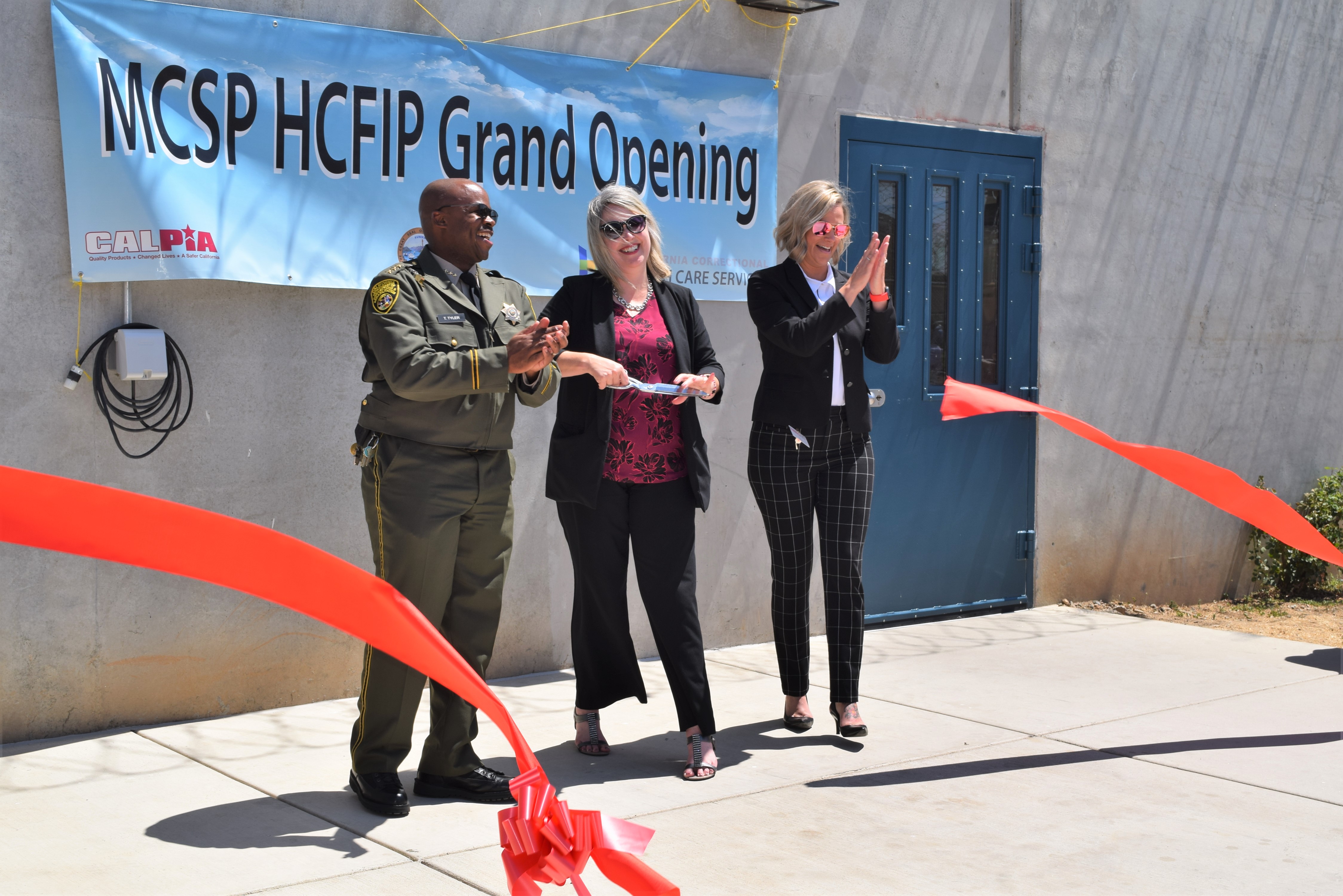Two major events boost prison morale
By Kyle Buis
After six projects and 13 subprojects, staff at the Mule Creek State Prison celebrated the grand opening of its revamped health facility.
More than 50 people gathered to celebrate on July 26, more than nine years after the first draft of the project was submitted. The effort is helping set a new, better standard for Mule Creek patients.
Chief Deputy Receiver Richard Kirkland and Undersecretary of Health Services Diana Toche were in attendance to celebrate the important milestone. The changes at the facility go beyond the physical building. It’s also a morale boost for staff.
“When you look good, you feel good,” Toche said.
The celebration marked the end of a challenging time for the facility as custody personnel had to manage the logistics of tracking workers and rerouting inmates as the project required. Through it all, Mule Creek continued to function normally.
“We repaired a ship as it was traveling across the ocean,” Kirkland said.
A slideshow revealed the big changes at MCSP since the project started. In his closing remarks, Acting Chief Deputy Warden Thomas Tyler said the changes would stick with staff for years to come.
“We’ve created a new normal,” he said.
As facility staff celebrated the end of one big mission, the guests of honor gave them a glimpse of future changes with the coming roll-out of the Integrated Substance Use Disorder Treatment Program.
“Healthcare doesn’t ever stay stagnant,” Kirkland said.’

Dog program helps people with PTSD and autism spectrum disorder
By Lt. Angelo Gonzalez
On July 26, five specially trained service dogs graduated with their inmate trainers on hand at Mule Creek State Prison (or MCSP). Through the Prisoners Overcoming Obstacles and Creating Hope (or POOCH) program, the five dogs were commissioned to help people with post-traumatic stress disorder and autism spectrum disorder.
Attending the graduation were MCSP custody and administrative staff, graduating dog recipients, Tender Loving Canine Assistance Dogs (or TLCAD) volunteers and MCSP inmate trainers and their approved visitors.
Service dog training organizations lack volunteers, skilled trainers and funding, and the need for service dogs far exceeds demand. The partnership between the TCLAD training organization and correctional institutions benefits the individuals who are in need of service dogs as well as incarcerated people who participate in the rehabilitative program.
Studies have shown that programs that involve training dogs can reduce violent incidences in the prison, reduce recidivism and provide an incentive for rule compliant behavior.
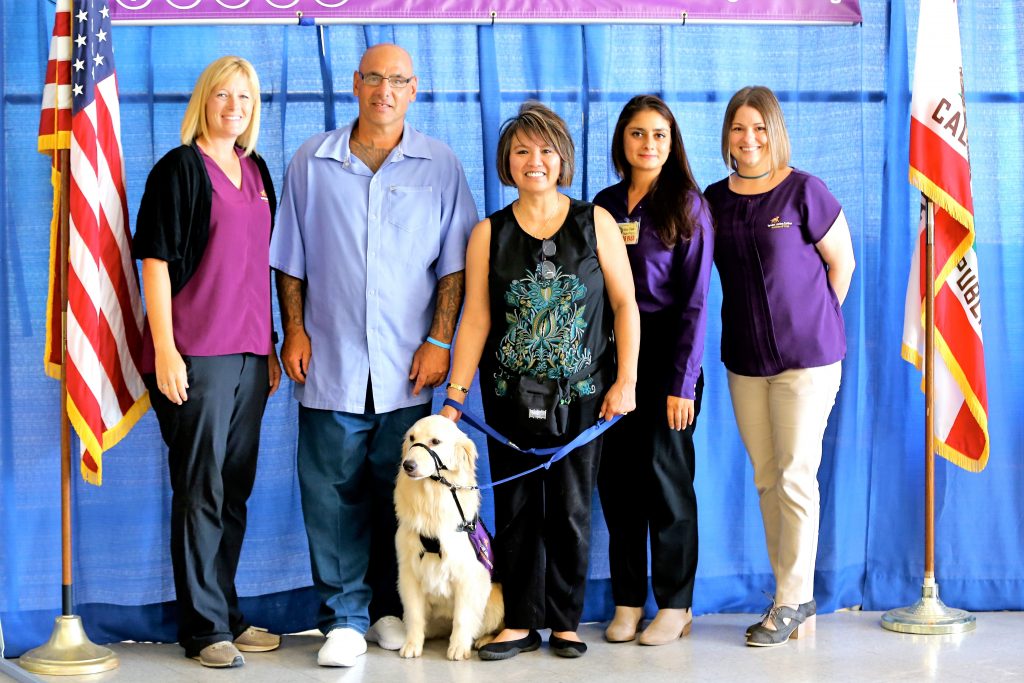
Meet the dogs
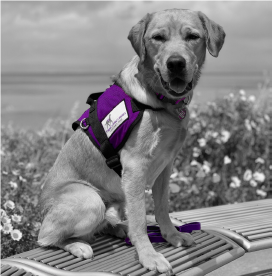
Leash-On-Life service dog Ione is a constant companion to a young man on the autism spectrum. By performing custom tasks, Ione is increasing independence and confidence for his companion.
“This opportunity to work with TLCAD and Ione was truly a blessing. Through this experience I learned what it took to actually care for someone besides myself. As well as what responsibility, patience, and accomplishment actually feels like. For this chance to restore my humanity again, I am grateful, thank you,” said trainer Ramon Garcia.

Facility dog Dean works beside school counselor, Lori, at a public elementary school. Dean is custom trained to modeling positive behavior and assist in mitigating symptoms of trauma.
“Dean was not only my friend but my teacher. We both taught each other. I taught him behaviors, and how to interact with people. But Dean taught me some very important lessons. He showed me unconditional love, taught me tolerance and patience and how to interact with people and not take things personally,” said Dean’s trainer, David Navarro.
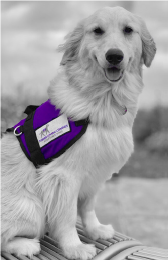
Courthouse facility dog Lavender works beside Suzanne at the San Joaquin Family Justice Center. Lavender is trained to support victims. She helps staff build a relationship and provide services to victims of crime.
“The fact is that I will be forever changed because of this beautiful little golden that I will call family forever. My best training experience with Lavender is probably when she showed how me to love something other than myself again. She captured that pretty quickly and reinforced it every day for nearly two years,” said Chad Smith, Lavender’s trainer.
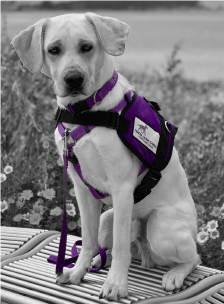
Courthouse facility dog Duke works beside Missy at Sutter County Victim Services. Duke is trained to support children in the Child Advocacy Center as well as in court.
“My time with Duke was sometimes challenging but was always rewarding. As much as I like to say I was training and taking care of him, the truth is that he was teaching me patience, forgiveness, and taking care of me too,” said Duke’s trainer, Mike Owens.
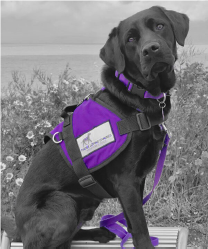
Leash-On-Life service dog Sutter is a constant companion to a young man on the autism spectrum. By performing custom tasks to address social skills and sensory needs, Sutter will open up a whole new world of possibilities for this young man and his family.
“Working with dogs has been life changing. I’ve learned so much. I’ve learned about patience, respect, being a teacher, a student, and empathy. I was taught teamwork, community, and how we all have our own unique value. Most of all I learned the value and purpose my life has. I’ve learned I am not just the sum of my worst mistakes. My past mistakes do not define me. There is redemption. Because of these beautiful dogs I am becoming the man I want to be. Now that’s time well spent,” said Joseph DeShon, Sutter’s trainer.
